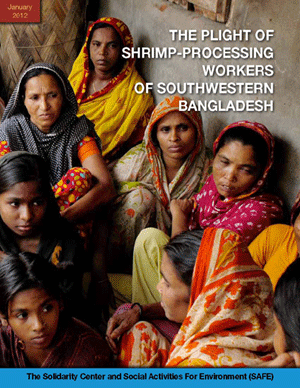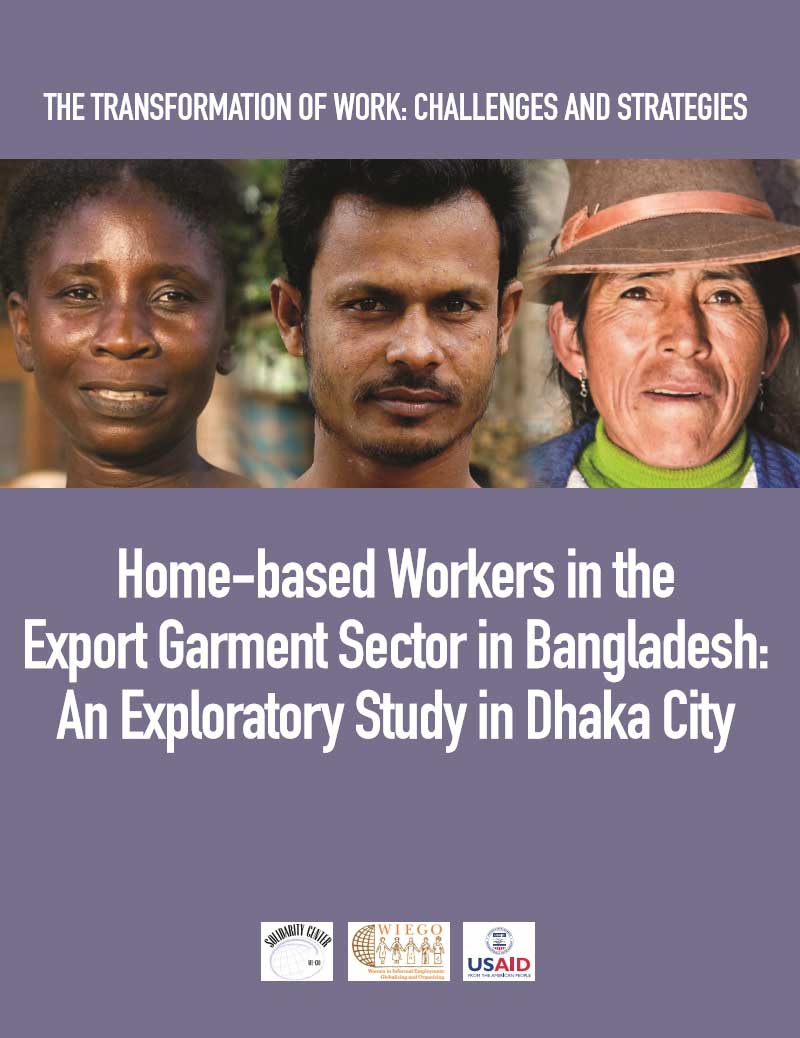Nov 28, 2012
Cheap clothes come at great cost in Bangladesh.
Last weekend, more than 110 garment workers died in a fire that burned the Tazreen Fashion Ltd. garment factory, located in the outskirts of Bangladesh’s capital, Dhaka. Women and men working overtime on the production lines—located on the second and third floors of the building—were trapped when fire broke out in the first-floor warehouse. With no fire escapes, the only exits were stairs leading to the first floor, where the fire raged. Workers scrambled toward the roof, jumped from upper floors, or were trampled by their panic-stricken co-workers. Some could not run fast enough and were lost to the flames and smoke.
The grieving aunt of one of the workers told the Solidarity Center’s Program Officer Rukshana Arzoo, “My nephew called his mother and said, ‘I will die as I will jump from the fourth floor. Please come and get my body’.”
According to news reports, Tazreen Fashion earns $36 million a year supplying garments to major buyers in the West. Before the embers had cooled, the company’s management promised to pay 100,000 taka (about $1,235), to families of the workers who perished. While this is the legal compensation rate for a worker killed on the job, it is a mere pittance to a multimillion-dollar exporter. And it raises a serious question: Is the life of a Bangladeshi garment worker worth only $1,235?
In Bangladesh’s garment factories—and in others around Asia—the relentless drive for cheap production often entails dangerous facilities, below-poverty wages, cramped conditions and an absence of health and safety programs. And it is the workers who pay. ABC News has best summed up the situation: “Bangladesh has become a favorite of many American retailers, drawn by the cheapest labor in the world, as low as 21 cents an hour, producing clothes in crowded conditions that would be illegal in the U.S. In the past five years, more than 700 Bangladeshi garment workers have died in factory fires.”
The trend is alarming. And instead of making real commitments to listening to workers, ensuring that they can organize to address concerns, building better factories and implementing programs to ensure the safety of the women and men whose labor generates enormous sums for business owners and the country, the garment industry has offered nebulous conspiracy theories for the Tazreen and other fires.
Yet, according to the Associated Press, “Authorities have formed three committees to look into the incident. An industry group has suggested that sabotage may be to blame, though fire officials have said it was not the fire itself, but the poor safety measures that caused the high death toll.”
No matter how the fire started, the factory was a death trap and its management must answer for the lives lost on its watch.
The Solidarity Center has been supporting workers’ rights—including providing fire safety training—in Bangladesh for years. We know from experience that in low-wage economies in general, companies find little reason to protect the rights and interests of workers—and that corporate self-regulation has proven a faulty tool for ensuring healthy and dignified workplaces. Meanwhile, vulnerable and impoverished workers cannot fight alone for their rights and, without the relative strength of a union to represent them, their lives hang in the balance.
So what has to happen to keep blood off Bangladesh-made clothes sold in Western stores? In the immediate term, the government of Bangladesh and the garment industry must pursue a transparent and serious investigation into the deadly Tazreen fire, prosecute those responsible, provide just compensation for the families of the dead and injured, and implement a serious and comprehensive fire safety and monitoring program.
But if authorities and buyers are serious about preventing a greater death toll, workers—whose lives are at risk and who know best how dangerous their workplace can be—must be able to assert their rights, organize unions with their co-workers, raise safety concerns and demand better working conditions according to their best judgment.
As eminent economist Debapriya Bhattacharya told Bangladesh’s Daily News this week, “Trade unions should be allowed since other institutions seem to have failed to protect the workers’ safety and interests… Otherwise, this type of incident will occur again and again.”
Nov 27, 2012
The Solidarity Center joins the international labor and human rights communities in expressing sorrow over the unnecessary and tragic loss of life at a Bangladesh garment factory over the weekend. Between 112 and 120 Bangladeshi garment workers—most of them women—have been confirmed killed in one of the nation’s worst industrial disasters in recent memory.
“Our hearts go out to the families and friends of those who lost their lives and to those who have been injured,” said Tim Ryan, Asia regional director for the Solidarity Center. “Workers should not have to risk their lives to make clothes.”
Even as the death toll continued to rise and many garment factories shut down as thousands of people protest the tragedy, another fire broke out at a 12-story garment factory on Monday, where eight workers were injured. Hundreds of Bangladeshi garment workers have been killed on the job in the past few years.
At the time of the fire, some 600 workers were in the factory, which employs 1,500 people and has sales of $35 million a year, according to the New York Times. Many jumped to their deaths trying to escape from the six-story building outside Dhaka, and those unable to escape the blaze were burned alive, according to the Clean Clothes Campaign. NBC News quotes Maj. Mohammad Mahbub, fire department operations director, who said there were no fire exits: “Had there been at least one emergency exit through outside the factory, the casualties would have been much lower.”
Ruhul Amin, general secretary of Bangladesh Federation of Workers Solidarity (BFWS), said that although the Prime Minister stated factory exits should not be locked during working hours, “the garment workers of Bangladesh now don’t have confidence in the inspection department of Bangladesh. So I am requesting the buyers to take care the issue very seriously. I also demand judiciary inquiry for the incident.”
The owners of the factory must be punished, said Aleaya, general secretary of Bangladesh Industrial Garment Workers Federation (BGIWF) and “should take responsibility for the injured workers.”
Bangladesh is now the world’s second-largest clothes exporter with overseas garment sales topping $19 billion last year, or 80 percent of total national exports. Yet the base pay for a garment worker in Bangladesh is the equivalent of $37 a month—the same monthly amount it costs to buy food for one person.
There are no local unions at the Tazreen Fashions factory to represent workers and ensure safe work sites. In fact, Bangladeshi garment workers struggling to gain safe working conditions and decent pay face huge opposition. Earlier this year, union activist Aminul Islam, a leader of the Bangladesh Garment and Industrial Workers Federation (BGIWF), a Solidarity Center partner, was tortured and murdered.
Police attacks against demonstrating workers demanding better working conditions and higher wages are widespread, according to a 2012 report by the United Nations.
The violence against Bangladeshi workers has captured the attention of human rights activists and policymakers in the United States. It was the subject of human rights hearing in Congress and Secretary of State Hillary Clinton, on a trip this year to Bangladesh, specifically addressed the unsolved murder of Islam.

Nov 24, 2012
Bangladesh’s labor code addresses pay, working hours, and on-the-job conditions. However, in the shrimp-processing industry, the code is not being adequately enforced. Bangladeshi shrimp-processing workers—the majority of whom are women—still face inadequate health and safety protections at work and receive less than the minimum wage, among other violations of their rights.
Download here.
Oct 3, 2012
The murder earlier this year of a Bangladeshi union organizer is part of an escalation of attacks on the nation’s 4 million garment workers who seek to change abusive working conditions, says Kalpona Akter, executive director of the Bangladesh Center for Worker Solidarity (BCWS).
Akter, who just ended a visit to the United States sponsored by Vanderbilt University and the International Labor Rights Forum (ILTF), worked closely with her BCWS colleague and factory union organizer, Aminul Islam, who was murdered earlier this year, his body found beaten and tortured. Islam also was a leader of Bangladesh Garment and Industrial Workers Federation (BGIWF), As recently as mid-September, Bangladesh police fired rubber bullets and tear gas at tens of thousands of garment workers rallying outside factories in an industrial area near Dhaka.
The violence against workers seeking to improve their conditions and the murder of a union activist have made workers fear forming unions. Although workers are willing to walk out of a factory demanding improvements, they are afraid to join a union because that could make them a target for firing or worse, says Akter, whose organization is a close partner of the Solidarity Center.
“They see the face [of Aminul] when he was alive and see the face when he is dead, and they are afraid,” she says.
Representatives of the Bangladesh garment sector were among the 23-member delegation accompanying Prime Minister Sheikh Hasina, who attended the 67th United Nations General Assembly in New York. They are urging the United States to allow duty-free access of their products. Global labor rights activists say the Bangladeshi garment industry should not have such benefits until factory working conditions improve and violence against workers ends.
The violence against Bangladeshi workers has captured the attention of human rights activists and policymakers in the United States. It was the subject of a human rights hearing in Congress and Secretary of State Hillary Clinton, on a recent trip to Bangladesh, specifically addressed the unsolved murder of Aminul.
Bangladesh is now the world’s second-largest clothes exporter with overseas garment sales topping $19 billion last year, or 80 percent of total national exports. Yet the base pay for a garment worker in Bangladesh is the equivalent of $37 a month—the same monthly amount it costs to buy food for one person.
Garment workers also are subject to verbal and physical abuse, unrealistic production targets and working conditions that may provide 25 toilets for a factory with 5,000 employees, says Akter, who was joined by Babul Akhter, president of the Bangladesh Garments & Industrial Workers Federation (BGIWF). In 2010, two factory fires that year killed dozens of workers.
Akter, Akhter and Aminul were imprisoned in 2010 on false charges for trying to improve the working conditions of garment workers. While imprisoned, Akter says she was interrogated for long periods and Akhter was beaten.
Akter, who started working in garment factories years ago as a young girl, says that stopping the violence against workers will begin after the government finds and prosecutes those who murdered Islam.
Take action now: Urge Bangladesh Prime Minister Hasina to investigate Islam’s murder, ensure the safety of workers and drop charges against labor rights activists.
The Solidarity Center spoke to Kalpona Akter and Babul Akhter during their visit to Washington, D.C.

Sep 24, 2012
Workers in the home-based export garment sector remain an invisible segment of the labor market, and this report is first step toward a systematic documentation of this phenomenon, with special emphasis on employment conditions, worker livelihoods and issues affecting unionization. This Solidarity Center report is part of a multiyear research project, funded by the U.S. Agency for International Development, to study the informal economy, migration, gender and rule of law together with research partners Rutgers and WIEGO.
Download here.


